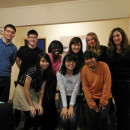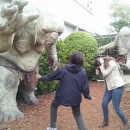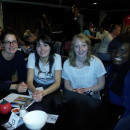Please Take Me Back to Middle Earth! Past Review
By Nneka W (Environmental Studies., Birmingham-Southern College) - abroad from 06/22/2013 to 11/17/2013 with
WorldStrides Study Abroad in Wellington, New Zealand
I gained lifelong friends and more knowledge in my major from a New Zealand perspective. Once you step outside of your comfort zone, you can have the time of your life.
Review Photos





Personal Information
| How much international exposure did you have prior to this program? | 2 weeks - 1 month |
Review Your Program
|
* Overall educational experience
Academic rigor, intensity, resources, etc. |
I was interested in getting the best international experience possible, so I enrolled in courses that were unique to New Zealand and the Pacific region. Apart from the classes, Vic has a Vic International Leadership Program that requires the attendance of seminars and speaker events. The info was really interesting and featured various subjects. |
|
* Host Country Program Administration
On-site administration of your program |
The TEAN staff abroad made me feel right at home. They were always available and gave prompt responses in all situations. Additionally, they did follow-ups throughout the semester and gave group invites to popular spots in the area. They gave advice on how to make a memorable experience by recommending hot spots or popular events, such as the weekly cultural night markets in Wellington. I personally had fun and exciting times with some of the TEAN staff, and we even became lifelong friends. We hung out on several occasions, and our moments are some of the best highlights of my experience with TEAN in general! Overall, TEAN shows how much they care by regularly being available and open to spending time with me and the other TEAN students. |
|
* Housing:
How satisfied were you with your living arrangements? |
I was extremely happy with my living arrangements. My preferences were handled excellently by matching me with the perfect roommates, and my neighbors were friendly. One of my roommates fit my personality so much that we became long-lost friends, and I made mutual friends through my other two roommates. Housing was close to campus and near a grocery store, and the RAs and Kiwi mates were also available when we needed them, especially during earthquakes! Housing was one of the best parts of my time in New Zealand. |
| * Food: |
I miss the food in New Zealand so much! All of the eggs were cage-free. There was a market every Sunday that sold fresh produce for a cheap price. There is a cultural market every Wednesday night that had food booths representing countries from France to India. |
|
* Social & Cultural Integration:
How integrated did you feel with the local culture? |
My new Kiwi friends made me feel right at home! Victoria University has an International Buddy Programme that matches you with a Kiwi buddy for a whole semester. My international buddy was the first Kiwi friend I made, and I met the majority of my Kiwi friends through that program at many events. I joined clubs at the university and made friends with people from other countries, including Samoa and Korea, and they fully accepted me. Anytime I didn't understand anything or made weird guesses, we'd laugh together and explain things or tell stories about each other's countries. I made lifelong friends there, and they're responsible for the wonderful memories I have from that semester. |
|
* Health Care:
How well were health issues addressed during the program? |
I visited the doctor and counselor at Victoria University several times, and they were easily accessible at Vic. Health insurance was fully covered at Vic, and medicine at the university's pharmacy was affordable. No vaccines were needed for New Zealand. |
| * Safety: |
Wellington was really safe, which is why I loved it so much. I walked alone at night from a friend's place with no troubles whatsoever. Wellington is not densely-populated, and streets are not so crowded. The people were really friendly. I only advise you to stay with friends when you're drinking at bars, but that's for any place, not just Wellington. |
| If you could do it all over again would you choose the same program? |
Yes
|
Finances
|
* Money: How easily were you able to live on a student's budget?
(1 = not very easy/$200+ on food & personal expenses/week, 2.5 = $100/week, 5 = very easily/minimal cost) |
Although currency rate is low, expenses can really add up. Thankfully, Victoria University has Student Funding program for students of low-income to provide money for food and personal items. I used the program once, and it helped me throughout the remainder of my time in New Zealand. |
| Not including program expenses, about how much money did you spend on food and other expenses each week? | under $75NZ |
| Do you have any general money-saving tips for future study abroad participants? | If you're in Wellington, do not forget to go to the market every Sunday for cheap produce. Cook at home instead of going to restaurants. You'll save a lot more. Be sure to go over a spending plan with your flatmates to determine who will restock the fridge. |
Language
| * Did your program have a foreign language component? | No |
Other Program Information
|
* Where did you live?
Select all that apply |
|
|
* Who did you live with?
Select all that apply |
|
|
* Who did you take classes with?
Select all that apply |
|
| About how many local friends did you make that you will likely keep in touch with? | 10+ |
A Look Back
| * What did you like most about the program? |
|
| * What could be improved? |
|
| * What do you know now that you wish you knew before going on this program? | I'm completely satisfied with TEAN, and I experienced no negative aspects during my time in New Zealand. |
Individual Course Reviews
| Course Name/Rating: |
Environment and Resources: New Zealand Perspectives |
| Course Department: | Geography, Environment and Earth Sciences |
| Instructor: | Ralph Chapman |
| Instruction Language: | English |
| Comments: | ENVI-GEOG 214 expanded on New Zealand’s view on the environment by exploring the policies and current environmental problems in New Zealand. Tutorials include experiential group projects that allow students to think critically and explore new ideas of how to improve public concern about several issues, including public transportation. Lecturers address topics from environmental management and natural resources, sometimes explaining New Zealand’s improvement over the years. The only exam was the final exam. There was only a group presentation and a major paper (about ten pages) for one term. This class fully broadens the students’ knowledge of not only what makes New Zealand’s a leading green country but also the struggles that they currently face. |
| Credit Transfer Issues: |
| Course Name/Rating: |
Antarctica: Unfreezing the Continent |
| Course Department: | Geography, Environment and Earth Sciences |
| Instructor: | Cliff Atkins |
| Instruction Language: | English |
| Comments: | ESCI 132 was an interesting and interactive class. Lectures consists of interesting topics from stories of famous Antarctic explorers to the significance of Antarctica in terms of climate change. Tutorials involved experiential activities that allows you to indirectly experience life in Antarctica, including preparation to travel to Antarctica to conduct scientific research. Lecturers consists of brilliant academics, including climate change scientists, who elaborate on the current conditions of the Antarctic ice, various techniques they use to contain accuracy, and ideas of how to decrease the effects of global warming. The class had a Facebook group where everyone helped each other prepare for the two in-class exams. There was no final exam, and it was one paper due during the term. The only homework was from the tutorials, and they weren't bad at all. Overall, it is a class that increases students’ knowledge of the entire continent of Antarctica from its history to its significance in detecting rapid changes in climate change. |
| Credit Transfer Issues: |
| Course Name/Rating: |
Music and Dance in Oceania |
| Course Department: | Music |
| Instructor: | Brian Diettrich |
| Instruction Language: | English |
| Comments: | MUSC 251 is not strictly about music and dance. It explores the significance of the diverse Pacific cultures in general. Excerpts from musical pieces, video clips, films, and authentic instruments are played during the semester. Each musical piece, instrument, and dance performance holds a special place to each island. The assigned readings provide details about the meaning behind Pacific rituals and lifestyles, and the class was interactive in giving their thoughts on the topics, such as lyrics. It allows students to think critically about the troubles and praises of the Pacific, including inaccurate stereotypes. There are two in-class exams and one major paper, along with weekly 400-word written reflections and one final exams. A paper topic is required weeks in advance to prepare for the paper, which is less than 5 pages. Students will gain knowledge on various islands from Samoa to Papua New Guinea and think open-mindedly in terms of culture and fine arts. |
| Credit Transfer Issues: |
| Course Name/Rating: |
Maori Society and Culture |
| Course Department: | Maori Studies |
| Instructor: | Arama Rata |
| Instruction Language: | English |
| Comments: | Maori Studies provided a strong cultural environment, and a large percentage of the class consists of Maori students. Some classes are introduced or concluded with a Maori prayer or speech by either the lecturer or a student. The classroom was fun and interactive as everyone was open to contribute to their thoughts on Maori perspectives on the environment and their status in society. It allows you to engage in Maori culture by participating in various activities, including a powhiri ritual at the university’s marae. There was only one final exam at the end of the course, but the papers throughout the semester were minimal and weren't so bad. Overall, Maori Studies gives students an excellent cultural experience. |
| Credit Transfer Issues: |








